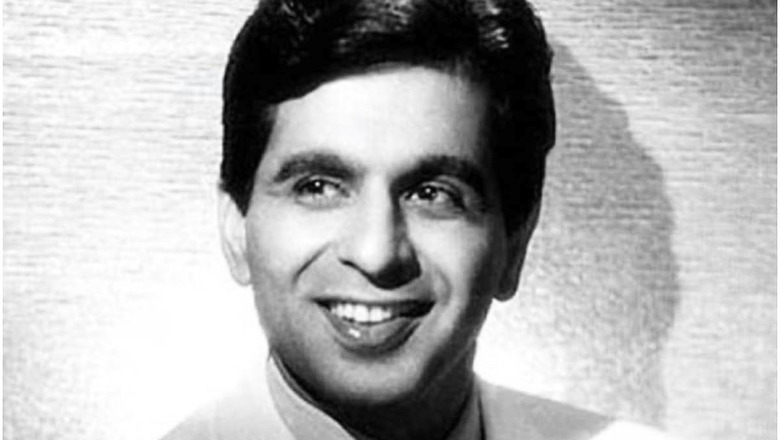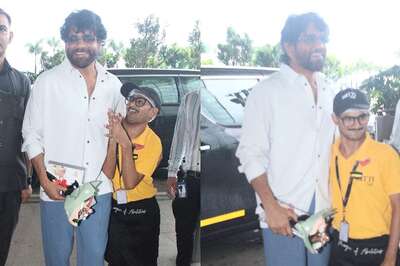
views
As a 20-something, perhaps I can’t compete with fans who have lived, loved and grown along with the thespian star. There are generations that separate us. But that doesn’t change the fact that I feel a deep sense of loss today as Dilip Kumar breathed his last. It’s been over a decade since the actor made any remarkable public appearance. It’s not like we were going to be gifted by his screen presence. But just knowing that we live in the same time as the legendary actor does was really enough.
Growing up, I couldn’t explain to my friends why I love Dilip Kumar. They couldn’t understand why I willingly watch B&W films and rave about an actor older than my grandfather.
But he was so charming, so brooding, so intense and so perfect. How can one not love him?
Like most good things in life, being a fan of Dilip Saab is also something I got from my father. Papa is his biggest fan. As an early teen I used to assist him in research for his first book “Mughal-e-Azam, An Epic of Eternal Love”. So what if my job was limited to handling newspaper cuttings, I took it very seriously. That’s when I entered the world of Indian Cinema in the ’50s and ’60s.
That was my introduction to the magic of Dilip Kumar. His portrayal of Prince Salim quite literally stole my teenage heart. Our family is crazy about that film. We have watched it countless times. Over the years, I’ve successfully converted some of my closest friends into Mughal-e-Azam fanatics.
And since then, there was no going back. I have LOVED Dilip Saab in Devdas, Andaaz, Aan, Ganga Jamuna, Madhumati, etc. And Naya Daur (1957) which, in my opinion, is a movie, par excellence. Dilip Kumar captured the aspirations of a young post-independence India. The movie also gave us one of the most iconic songs of his career – “Ude jab jab zulfein teri… kawariyon ka dil machle jind meriye!” (YES!)
A song was written celebrating the beauty of the hero and not the heroine – this did not happen very often in that era.
The more I read about the thespian, the more intrigued I was. He wowed the world with his versatility.
A lesser known fact that showcases his dynamism and versatility is that he shot for Devdas, Ganga Jamuna & Mughal-e-Azam around the same time. Switching from the polished Urdu of a Prince in Mughal-e-Azam to the Bhojpuri dialect of a dacoit in Ganga Jamuna and then a dejected, doomed lover in Devdas.
He put his heart and soul into every project. He was unmatched as ‘tragedy king’ of the Hindi film industry. In almost every film in the ’50s, we saw Dilip Kumar’s character dying at the end and always losing the heroine. Producers wanted his character to meet a love-lost, tragic end as that ensured box-office success.
He would immerse himself into his characters, so much so that playing tragic roles started taking a toll on his mental health. He was advised by a London based doctor to take a break from serious roles and work on comedies and romance. That’s when he took up projects like ‘Ram Aur Shyam’, ‘Azaad’ and ‘Kohinoor’.
Dilip Kumar would completely dedicate himself to the project in hand. On at least two occasions, he was willing to compromise on his fee in order to save a film’s vision. During the making of ‘Mughal-e-Azam’, producers Shapoorji-Pallonji refused to release further funding to director K Asif at one point. Dilip Kumar stepped in and offered to forgo his fee so that the extravagant financial needs of K Asif’s magnum opus could be met. Dilip Kumar also didn’t take his remuneration of around 70,000 rupees from Bimal Roy for ‘Madhumati’ as the film had gone over-budget and Kumar didn’t want Roy to compromise on the production quality.
It’s not for nothing that every great actor we have, from Amitabh Bachchan to Shah Rukh Khan, has admitted to being inspired by his craft. We’re blessed to have had him.
Papa is presently working on a book on his movies. That means, I’ll again be assisting him in some form. That also means, I will once again be watching some of the best movies Indian cinema has ever made and will be re-living the magic of Dilip Kumar.
Legends like him never die. He’s been immortalised in our hearts.
And he’ll continue to be an institution of acting for generations to come.
Thank you for some of the best childhood memories. Love you, Dilip Saab.
Read all the Latest News, Breaking News and Coronavirus News here.



















Comments
0 comment